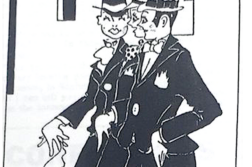THE ISSUE OF THE CLOSET comes and goes in gay life. After lying dormant for at least a decade, it had a brief revival this summer when two Washington activists threatened to out people on the staff of Congressmen who supported the Federal Marriage Amendment. Not much came of that. But then Governor McGreevey of New Jersey came out—pushed out, really, by a former boyfriend he’d put on the state payroll, an Israeli citizen named Golan Cipel, who said he was going to sue the governor for sexual harassment. You would think an announcement by a governor—the highest elected official to come out so far—would have been greeted with a certain amount of admiration; but the circumstances around it made McGreevey’s coming out so murky that his grace under pressure got him anything but what you might have expected it deserved: applause.
Governor McGreevey’s announcement was dramatic and moving; but public reaction hardly acknowledged that. Instead, the media suggested that he’d played the gay card to distract attention from his other problems. McGreevey was already in trouble, the New York Times pointed out, because of scandals involving some of the big contributors to his political campaign—among them a man who had recently tried to bribe his own brother-in-law by hiring a prostitute to influence his vote on another matter. This same fat cat was also on the board of a Brooklyn college that wanted a state license to open a medical school in New Jersey—so when Cipel (the former boyfriend) and his lawyer allegedly offered to drop the lawsuit against McGreevey in exchange for that college’s being granted a license (and five million bucks), it looked as if the cynics must be right. This was no mere coming out. This was New Jersey politics. Hank Stuever, in a hard-boiled essay in the Washington Post on McGreevey and other closet cases, asked: “Who has time to hold the hands of these hopelessly outmoded fools?” (His answer: the gay community, which always takes closet cases in because no one else will.)
In fact, much of the gay press was unmoved by McGreevey’s auto-da-fé: Michael Musto wrote a piece in the Village Voice that was wry, skeptical, jaded and unimpressed, while Michelangelo Signorile wondered why there always has to be an evil queen in these gay stories. (Cf. Andrew Cunanan.) Someone even reported that people had seen Cipel in the bars on the Upper West Side; most gay men groaned when Cipel, back in Israel, announced that he was straight and only wanted to put this behind him and move on. People asked why McGreevey should have to resign just because he’s gay. Tina Brown wondered what would happen to McGreevey’s family. What happened is that the McGreevey’s retreated into their own domestic privacy, and a few months later the Governor resigned on schedule after giving another speech and will now join a New Jersey law firm. So what was this about?
What struck me about the incident was not just that McGreevey had apparently neutralized an attempt by a boyfriend and his lawyer to extort money from him, but that the press thought it unnecessary to comment on the most obvious aspect of this story: McGreevey had not allowed himself to be blackmailed. The fact that a governor (the first ever) had admitted he was homosexual had been lost in a debate about his political motives.
So let me be retro and naïve: Cipel seemed to me a villain from the beginning. The threat to expose McGreevey looked as old as the days of Oscar Wilde and as recent as Advise and Consent. The latter was a book and later a movie about a senator who commits suicide while being blackmailed (over a wartime romance with another man) during a Senate hearing on the nomination of a liberal for secretary of state. The book was inspired by a real senator’s suicide in l954 during a witch hunt against homosexuals (described in a book reviewed in this journal’s September-October 2004 issue, David Johnson’s The Lavender Scare).
The atmosphere of Advise and Consent is admittedly very 1950’s, when you were either on the side of the American family or Communism. Homosexuals belonged to the latter. Hollywood’s first-ever depiction of a gay bar shows Don Murray looking for his blackmailer in a lurid den of iniquity where a spotlight plays across the faces and forms of a lot of swishy queens. After a fight with his ex-flame, Murray flies back to Washington in a panic attack, locks himself in his Senate office, and cuts his throat. In real life, in 1954, Senator Hunt, Democrat of Wyoming, used a shotgun after his enemies threatened to make his son’s homosexuality an issue in the senator’s re-election campaign. In 2004, however, Governor McGreevey went on national TV beside his wife and parents to say that “one has to look deeply into the mirror of one’s soul and decide one’s unique truth in the world, not as we may want to see it or hope to see it, but as it is. And so my truth is that I am a gay American.”
How times change! It was one of the ironies of this speech that the last sentence turns out to have been focus-group tested first by the gay lobbying group the Human Rights Campaign during consultations with the governor on his coming out. The insistence of the last two words, “gay American,” reflects something very post-50’s: the gay movement, and its subsequent assimilation into the mainstream. This must be the reason McGreevey’s press conference brought to mind not only Advise and Consent, but also the 1989 movie In and Out, Paul Rudnick’s screenplay about a teacher who’s inadvertently outed by a former student who thanks him while receiving an Oscar—a plot also based on an incident in real life. In other words, in the hubbub of McGreevey’s announcement, if we are honest, there was something slightly comical, too: what once was tragedy was now being repeated as farce. What once was blackmail was now In and Out—or Will & Grace.
However, Will & Grace has tried hard to be a gay version of I Love Lucy, but outing someone is not really comical. If there is a difference between being outed and blackmailed (the choices McGreevey faced), it’s only in degree. Both stem from the fact that, as Freud wrote to an American mother many years ago, being homosexual is not exactly an advantage. That was why the reaction to the McGreevey story was in the end so surprising. It seemed to say that it’s no big deal anymore to announce that you are homosexual; not even when you are a state governor (in the Northeast, at least). About the closet we’ve all become blasé.
But is the closet something to be blasé about? In the galaxy of gay American sociology, the dark matter is still all those people who cannot be included in statistical estimates for a simple reason: they’re invisible. Ghosts! In sports, entertainment, small towns, and academia, who knows how many they are? National Coming Out Day is generally a non-event. The old fantasy—that one day every gay person will suddenly glow purple—is still alluring because none of us has any idea what the streets, offices, or colleges would look like on such an occasion. That’s why McGreevey’s coming out was so moving. We’ve left behind the days when Senator Hunt shot himself because his gay son had been arrested in a public park; or when LBJ’s assistant Walter Jenkins was abandoned by the President after being arrested for having sex in the men’s room of the YMCA; or when conservative Congressman Robert Bauman was blackmailed by a call boy, and Gerry Studds was threatened by homosexual scandal, and Barney Frank (“Barney Fag,” in Dick Armey’s words) was attacked after a former boyfriend began using his home to pimp callboys. But we haven’t left them behind altogether. Governor McGreevey’s speech beside his wife and parents was testimony to the still-loaded quality of homosexual identity.
The late writer John Preston once said the point of the gay movement was that some day being gay would be a neutral fact. The press conference in Trenton implied we are only halfway there. It was good to hear some people ask, why should McGreevey have to quit public office because he’s gay? It’s a reasonable question. (And so is this: could McGreevey have run, and won, as an openly gay man?) All McGreevey said was that the attention given to the lawsuit would have impaired his ability to govern.
In the end, you can argue over many aspects of McGreevey’s case, as the press in fact did. But what was wrong with the deconstruction of his announcement was that it was a little too cynical. This may have been New Jersey politics. But McGreevey’s statement was a reply to people (Cipel and his lawyer) who thought being gay is anything but a neutral fact. The latter is an opinion shared evidently by the inestimable number of prominent people in this country who still feel they cannot admit they are homosexual. McGreevey, at least, did the right thing.
Andrew Holleran’s latest book of fiction is a collection of short stories, In September, The Light Changes.





